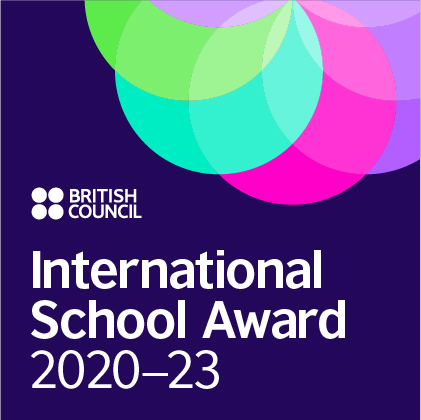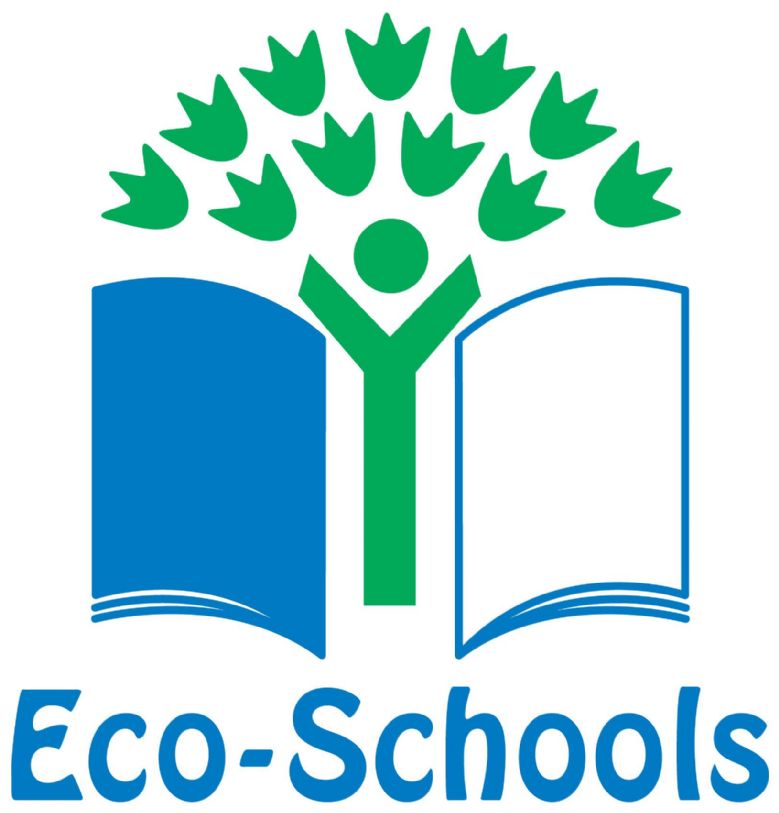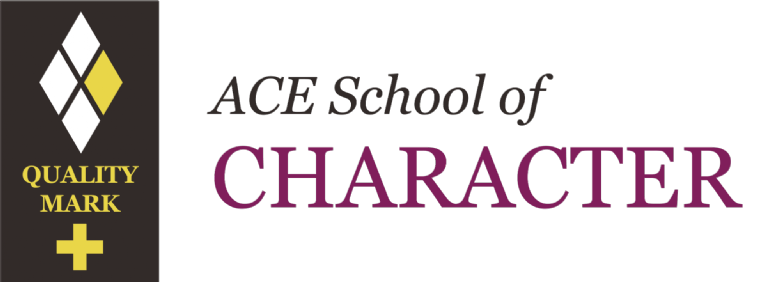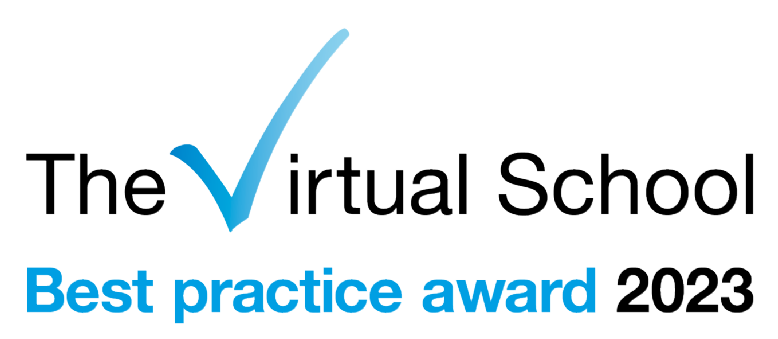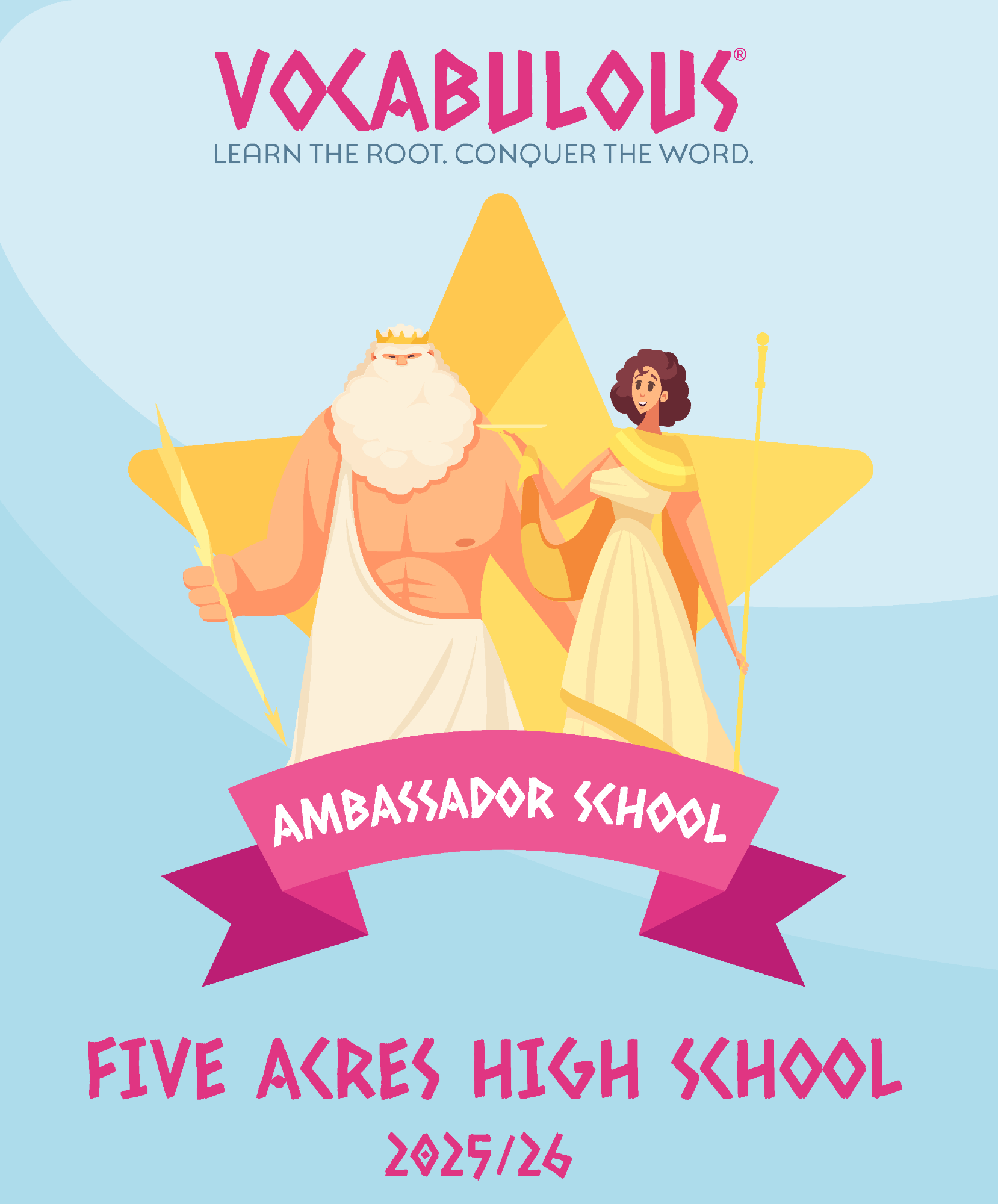Subjects
A common Greenshaw Learning Trust KS3 curriculum design means that we aspire that all pupils will experience a challenging, world-class curriculum. Through the guidance of our curriculum curators, each department has created a curriculum centred around our "Big Ideas" for each subject: the key principles and concepts behind each subject area – the background or ‘hinterland’ which is the bedrock to getting to the heart of each discipline.
This ensures all of our pupils (and especially disadvantaged pupils) have rigorous, well-structured schemes of work, and in addition will have enrichment opportunities to build cultural capital, including regular exposure to aspirational experiences, including university visits.
Our Greenshaw Canon is a list of books that we have created to enrich, inspire, challenge and broaden our pupils’ experiences of the world. This also contributes to our Character Education (Determination: Literacy). For reading 10 books, pupils will receive the Bronze award, for 25 the Silver and for 50 the Gold. This enriching experience is both a challenge and a joy. The selection is international, culturally diverse, and allows our staff and children to learn and share together “the best that has been thought, written and said”.
We expect our teachers to plan and think deeply about how best to teach our curriculum to the needs of the children in front of them. We have a three year KS3 which attempts to accomplish both breadth of exposure and digging into depth of discipline. We are proud of our investment in the arts, languages, humanities in addition to the very strong core experience. All of our Y7 and Y8 sing in our exceptional choir, which is supported by four musical graduates and experts. We ensure that our young sportsmen and women have access to professional coaches.
To find out more about our curriculum, please contact our Assistant Headteacher (Curriculum), Miss Leah Turvey (lturvey@5acreshighschool.co.uk).
Art
In Art, our vision is to guide students to discover and nurture their own identity through the appreciation and making of art. We encourage them to consider different art forms, artists and disciplines to further challenge/enhance their own perceptions and opinions.
Art students will be able to consider and articulate aspects of art theory within their own and others work, as well as apply their knowledge of the formal elements to analyse work, both in verbal and written form. They will be able to develop ideas by analysing different contextual sources, experiment with a range of materials and techniques, record information through drawing and written annotations and finally respond to a theme by developing a final outcome that reflects upon the learning journey.
Studying art enables students to solve creative problems; a skill much desired by many employers, There are a number of colleges and sixth forms that offer tailored courses in a range of art disciplines with many leading to opportunities to develop subject specific skills at university or working within the creative industries. The UK economy benefits immensely from the diverse and expanding field of art including careers such as illustrators, graphic designers, photographers, art historians, museum and gallery creators, animators, fashion designers, art therapists and architects to name just a few. Apart from these different career paths, studying art is also hugely important in developing cultural capital, which aims to develop a student's character, promoting diversity and mental well-being.
Business
Our vision is that students will learn about the principles of customer service and how retailers use these to set the standards that are at the heart of the customer experience.
Students will develop research skills so that they can investigate the quality of the customer experience across different retailers, analysing and presenting their findings, and they will explore and gain an understanding of how customer service affects the behaviour of both customers and employees.
Students will also learn how retailers prepare for changes by re-organising their operations. Students will learn about the everyday activities of a retailer and how different retailers organise these activities giving them a deep understanding of the retails environment and the roles and responsibilities of those that are employed within this industry.
Computer Science
Design & Technology
Throughout KS3, students will experience a full Design Technology curriculum, rich with theory knowledge and skills application. Students will experience their own project management through the making of a practical outcome in Years 7, 8 & 9, with a focus on different materials, equipment and machinery year-on-year. Alongside the practical element of the lesson, students will cover drawing and design skills as well as how DT affects the wider world by asking students to consider the bigger questions, such as is all design sustainable, is failure of an idea important, will the rise of CAD/CAM and AI change the design industry?
At KS4, students can choose one of two courses within the subject, the Cambridge National Award in Engineering Design and the GCSE in Design Technology. Both courses have coursework and exam elements with the aim that students really cement the ideas from maths and physics into design. Students should be able to problem solve independently when it comes to running their own projects.
Students who study DT/Engineering at KS4 can go on to undertake apprenticeships or further education placements before embarking on a range of careers including architect, graphic designer, visual merchandiser, carpenter, fashion designer and product designer.
Drama
Drama provides students with creative experiences that they can take with them into the wider world. Studying Drama not only trains and actor for the stage and screen but also gives them opportunities to build character and confidence. Drama allows students to develop their communication skills, creativity and imagination. It allows students to experience a situation that they wouldn't usually have the opportunity to in a safe and controlled environment. Our students learn about the processes of creating drama, interpretation and intention with the vision to engage in key performance skills that will help them in both their school and personal lives.
The KS3 curriculum allows students to engage with the subject practically and theoretically through topics such as the Black Lives Matter movement, stage combat and soap operas. Alongside this, students will also encounter a variety of well-known dramatists and practitioners, studying their respected styles of performance. These include naturalism, horror theatre, theatre of the oppressed and physical theatre. Students will also have the opportunity to practically explore Shakespeare, analysing themes and characters in a different way to how they would in an English classroom. The vision is that students will develop a range of performance skills, techniques and subject knowledge that will embed their understanding and lay foundations for KS4.
The KS4 curriculum allows students to deepen their subject knowledge on specific styles and elements of the theatre. Students are expected to fully engage in both practical and theory lessons, which encourage them to analyse and evaluate the performance work of themselves and professional performers. The vision for our KS4 curriculum is to not only give our students the best chance of success but also to prepare them for studying Drama post-16. Not only could studying Drama give students the platform to work in TV, field or theatre, but it is also a sought-after qualification in media, journalism, teaching and many areas of the public sector.
Economics
At Five Acres High School, the curriculum for Economics is centred around the AQA specification for GCSE Economics (as Economics is offered as a GCSE option from Y10). Across these years, students will explore two overarching fields of Economic theory: 'how markets work' and 'how the economy works'. In the former, students will explore the role of economic agents; the different economic sectors; the advantages and disadvantages of specialisation; the division of labour; the demand and supply of goods and services; the functionality of markets, prices and costs. In the second, students will develop knowledge and understanding of investment; interest-rates; inflation; government spending; government objectives and policies; economic growth; employment and unemployment; globalisation; exchange rates and international trade.
The vision for the Economics curriculum will enable students to develop knowledge and understanding of how economies operate in micro contexts (within businesses, firms and organisations) and macro contexts (within and between countries). It will equip students with the skills to analyse and evaluate qualitative and quantitative sources and data, which are invaluable skills for academic success, employability, adulthood and being a responsible global citizen.
In addition to developing sound literacy and numeracy skills, the curriculum will also strengthen students' financial literacy and cross-curricular knowledge, enabling them to identify, explain and evaluate how economic contexts influence and connect with other academic disciplines such as English, Geography and History. Such knowledge and understanding will enable learners to understand contemporary economic issues and engage in economic debate and activity.
Given the scope of the curriculum and variety of skills developed, the curriculum will prepare students for a multitude of occupations, careers and professions, such as in financial services, the corporate sector and Politics.
Engineering
At Five Acres High School, we are proud to offer a rigorous and ambitious Engineering curriculum. Alongside academics, students are encouraged to think outside the box and come up with creative solutions to real life design briefs. Students will experience a range of different activities provided by our curriculum such as running their own research project with a focus on product analysis and disassembly, producing and presenting engineered drawings and 3D realisation.
English
In English, our vision is to provide our students with the wisdom to think about the different ways in which writers have explored what it means to be human. We seek to immerse students in an exploration of different voices and times by using a wide variety of imagined realities and real experiences in order to develop a love of reading, writing, language and social diversity.
Our students gain experience with different text types; identifying specific information; comparing texts; evaluating texts; working out how texts are structured. We want our students to leave us in Year 11, encouraged to question the world around them with the confidence to go out and be successful.
Taking English Language and Literature can help to provide students with a firm academic base which fits well with a range of academic subjects post 16. This could include going on to study a range of subjects in further and higher education such as journalism, teaching, art and business administration as well as public and media relations, advertising and marketing.
Food Technology
The vision of our Food Technology, Hospitality and Catering curriculum is to create independent, sage and confident practical application of culinary skills, underpinned by a thorough understanding of nutrition and food provenance.
We champion the importance of teaching food and nutrition to all students for a wide range of personal, social and environmental reasons. Students are provided with the skills and knowledge to be able to cook and apply the principles of nutrition and healthy eating. This is important for our students so that they are able to feed themselves and others nutritionally and affordably to ensure a balanced and healthy life.
Providing our KS3 students with the key skills supports their progression into knowledgeable and healthy people and can work towards a role within the Hospitality & Catering industries. Knowledge of these industries underpins the execution of our curriculum, giving students an advantage over others when the time comes for students to seek employment.
Alongside this, students are taught the physical impact of healthy eating and how we can show tolerance and understanding of those from different cultures, backgrounds and dietary requirements through the adaptation of existing recipes. Students are pushed to consider the environmental impact of the hospitality and catering industries with importance placed on ensuring our approach to food and nutrition is met with a desire to produce healthy food sustainably through the application of preparation skills, ingredient choices and practical processes.
Geography
The vision of the Geography curriculum is to ensure that students have an awareness and appreciation of the human and physical world. To inspire a sense of awe and wonder and instil a tolerance and appreciation of diverse places, people and resources.
The curriculum explores and engages with a broad range of concepts and ideas which not only enable students to understand their own part of the world but also take students beyond their immediate locality. The subject provides students with an opportunity to develop enquiry skills which will encourage them to question and think about issues and debates around the subject. Through all of this, the vision is to cultivate a love of the subject that propels students towards a future interest in our planet in order to become an active participant in the future of our planet.
History
The vision for the school's History curriculum is to provide our students with core historical knowledge that they can use in their future study and be able to contextualise historical examples and metaphors in other settings. Students will explore and engage with diverse histories beyond their immediate context. We want to equip students with an array of critical skills and an analytical frame of mind, at the same time cultivating a love of the subject that propels students towards a future interest in the past.
Studying History will help to provide students with a firm academic base which fits well with a range of academic subjects post-16. This could include going on to study at further and higher education institutes and can include career pathways such as journalism and media, teaching, law, archaeology and art history.
Year 11 Site Study Photos - Chepstow Castle - History Around Us GCSE Unit of Study
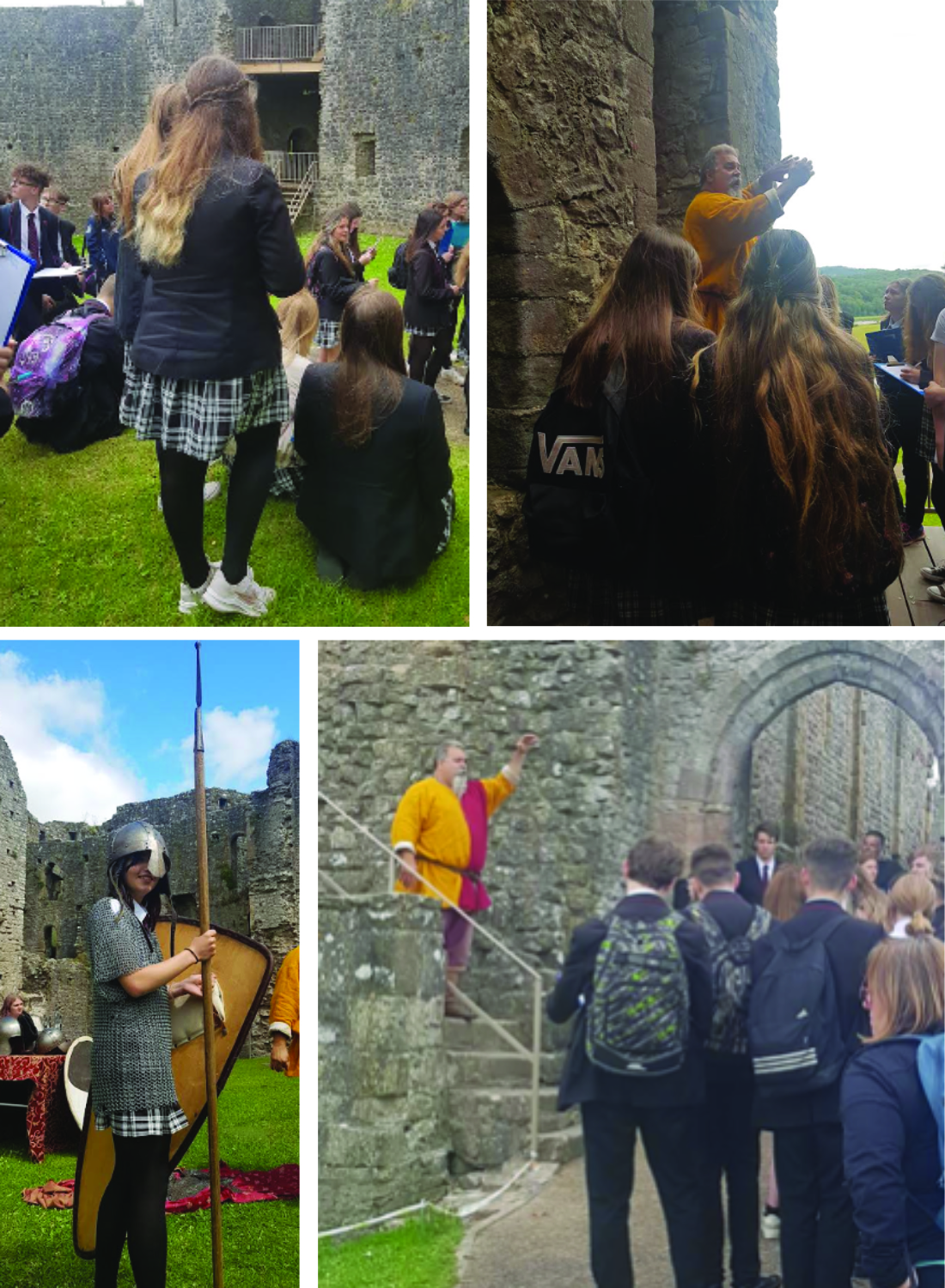
KS3 Curriculum
KS4 Curriculum
Maths
Our vision in Maths is that students will have the knowledge to make logical connections, with the confidence to approach any problem with resilience and determination in order to achieve and be successful. Students are taught how to become fluent in the fundamentals of mathematics through varied and frequent practice with increasingly complex problems over time, developing conceptual understanding and the ability to recall and apply knowledge rapidly and accurately. Students will be able to reason mathematically by following a line of enquiry, conjecturing relationships and generalisations, developing an argument, justification or proof using mathematical language.
Students should be able to solve problems by applying their mathematics to a variety of routine and non-routine problems with increasing sophistication, including breaking down problems into a series of simpler steps and persevering in seeking solutions.
The vision is to develop students' character, including resilience, confidence and independence, so that students contribute positively to the life of the school, their local community and the wider environment. Through Maths, we shall build fluent learners through representation, variation and structure, which they will achieve through mathematical thinking and coherence.
Modern Foreign Languages
The vision of our MFL curriculum is to use a knowledge-led, research-informed approach to embed key vocabulary, grammar, phonics and cultural awareness. This, combined with carefully-planned sequencing to regularly revisit content and make links to support retention, progress and fluency will create confident, passionate linguists.
Through our curriculum, our vision is to support students to:
- Progress from basics to mastery of a language, developing comprehensive knowledge for a wide range of situations
- Become skilled listeners and speakers
- Be enriched and challenged personally and as global citizens
- Develop cultural awareness and appreciation
- Be prepared for KS4 and next steps in the education and professional lives
- Improve their understanding of and literacy in English
Music
Students who experience our Music curriculum engage both practically and theoretically with Music through topics such as Minimalism, World and Folk Music, Keyboard and Performance Skills. Through doing so, students will develop a range of personal and professional skills throughout KS3, which can be beneficial both in and outside the music classroom, building confidence, communication skills, creativity and imagination.
Alongside this, students will encounter a variety of well-known composers and world-class practitioners, studying their respected styles of composition and performance, which will inform students' creative decisions and prepare them for KS4 and beyond.
Studying Music opens doors to not only various careers within the music industry itself, such as producing, performing, sound engineering, radio DJing, teaching, Music therapy, to name a few.
In KS4, our students follow the Pearson BTec Award Level 1/2 in Music Practice, which allows them to deepen their subject knowledge on specific styles and elements of Music, concentrating on the personal and professional skills needed for the specialisms of performance, composition and production. Students will experience both practical and theoretical lessons, which encourage them to analyse and evaluate their own creativity and performance skills, as well as those of their peers. Students are given exciting opportunities to continue, or take up, instrumental and vocal lessons with tutors who are experts in their field, and participate in workshops both in class and with professionals in the industry.
PCSHE
The Five Acres High School PCSHE curriculum is ambitious and bold in intent.
To view a full list of PCSHE resources, for each year group, click here.
PE
In PE, our vision is to help our students develop into adults who have an understanding of the benefits to committing to sport and/or physical activity, by providing students with a range of opportunities to develop as learners, leaders, competitors, team-mates, winners and losers. Students will experience a curriculum that continually stresses the true value of sporting involvement and physical activity.
Key to this is developing every student's Social, Physical and Emotional wellbeing:
Physical Competence - Excellent Sporting Performance - Realising potential through Performance and Excellence. Encouraging student to be the best they can be, with many opportunities in our extra-curricular programme.
Health and Wellbeing - In promoting health and positive lifestyles through artistic expression and physical activity, this being of equal importance at all levels of ability.
Social skills - Character & Employability (Personal & Life Skills - In developing positive attitudes, encouraging a sense of responsibility to oneself and others, whilst generating a sense of fairness, honest involvement and outstanding behaviour. We see teamwork, leadership and problem-solving develop through sport and physical activity.
Photography
Students will be shown a deep understanding of the contextual influences of a variety of historical and contemporary photographers and artists and how their work has been used to represent a wide range of messages. Students will understand and be able to use the technical properties of a camera to produce personal and meaningful imagery taking inspiration from the artists and photographers studied. They will understand the ways in which meanings, ideas and intentions can be communicated through the use of figurative and non-figurative forms, image manipulation, close up and imaginative interpretation as well as through visual and tactile elements such as: colour, line, form, tone, texture, shape, pattern, composition, scale, sequence, surface and contrast.
Our students will use their creative skills alongside their engagement in a range of discourse to understand that Photography can not only be a way to capture a moment in time but can be used as a vehicle for social, cultural and political change. Students will develop their critical understanding of existing artwork and will approach this, and their own work, with a discriminatory lens to ensure that their work is refined and demonstrates a clear link between intention and outcome.
Religious Education
In Religious Education, our vision is that the RE curriculum will extend and deepen students' knowledge and understanding of a range of religions and beliefs, recognising their local, national (individual liberty, mutual respect and tolerance of those of different faiths and beliefs) and global context. Key questions will allow students to understand how belief influences actions and lives of individuals and groups. Students will be able to recognise RE within other subjects and disciplines.
Science
In Science our vision is to produce students that are scientifically literate by encouraging them to have the knowledge to make critical judgements, have the skills to critically analyse information and to achieve the examination results, curiosity and passion for science so that they can pursue the subject beyond Five Acres High School.



